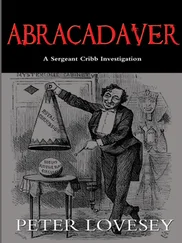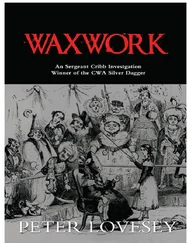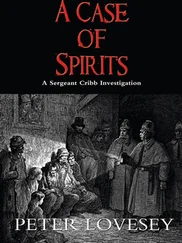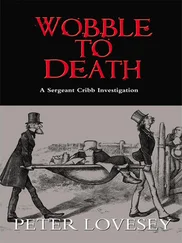Among those theories listed in the newspaper there was no hint of the suspicion about Steph's former husband, Dixon-Bligh. He'd given away nothing on that front because it was a line of enquiry he was pursuing alone. He didn't want Steph's past life dissected by the press or the police unless it proved absolutely unavoidable. If Dixon-Bligh or anyone else had tried to blackmail her, he would root out the dusty old secrets himself – and he didn't expect they amounted to much.
One question the gently probing reporter hadn't put to him: was it bloody-mindedness that set him against McGarvie at every turn? Bloody-mindedness? It's not so simple as that, ma'am. It's force of circumstance. I'm under an embargo, you see, orders from above to leave the detective work to the murder squad. But don't you feel bitter about all the horseshit thrown at you by McGarvie, the false charges, the invasion of your privacy? I've got broad shoulders. I can take it. Or the abysmal lack of progress in the investigation? It's a brute of a case, my dear. But if I'm totally honest, if you were to tease the truth from me, I'd be forced to admit that, yes, there could be a tiny chip on these broad shoulders of mine: I hate the man.
In the next week, doggedly pursuing his own line of enquiry, he took another trip to London and looked up Dixon-Bligh – or tried to. There was a twist in the plot, and not a welcome one. The house in Westway Terrace was empty. The boxes and the few bits of furniture had gone from the front room. A neighbour said she hadn't seen the gent for weeks. The Post Office had no forwarding address. Dixon-Bligh had done another flit.
* * *
The trains on the Portsmouth line to Waterloo had run better than usual lately. The winter problems of frozen points and leaves on the line had meant a few delays and cancellations earlier in the year, but compared to previous years the service was improving. Whether the credit went to Mother Nature or the railway companies was much debated by the regular commuters. But as long as the wheels continued to roll along the tracks it was all good-humoured stuff.
Then one September morning when it was still too early for frosts or leaves, an 'incident' (unspecified, except it was 'up the line') brought everything to a prolonged halt. People don't like sitting in stationary trains for any length of time. For one thing they have places to go to, appointments to keep; and for another they feel unsafe.
There's that troublesome suspicion that the longer your train waits the more likely it is that another will come along behind and smash into it. There are signals to prevent such catastrophes, but signals have been known to fail.
In the 7.37 from Portsmouth, some people blocked out their nervous thoughts by turning to newspaper articles they would otherwise have skipped, about travel in the Greek Islands or training for the marathon. Others switched on their mobiles and rescheduled the morning. A few made eye contact with the passengers opposite and gave little tilts of the head that said you couldn't travel anywhere with confidence these days. This being Britain, not many words were exchanged at first, but after twenty minutes voices began to be heard.
'Where are we, exactly?'
'You talking to me?'
'I said where are we?'
'Almost at Woking, I reckon.'
'What do they mean – an "incident"?'
'Could be anything from a suicide to cows on the line.'
'I blame privatisation.'
'No, it goes back further than that. It all started going wrong about the time British Rail stopped calling us passengers. When I first heard myself being called a customer I knew they'd stopped trying to get us from A to B as their first aim. They were out to sell us things.'
'You mean the reason we're all sitting here is so they can empty the refreshment trolley?'
'Dead right'
One man in a pinstripe let down the window and looked out. 'There's another train pulled up ahead of us. Must be the 7.07.'
'My sainted aunt,' a reader of the Independent said. 'They won't let us move until that one's well clear.'
The pinstriped man turned from the window and reached for his hat and umbrella.
'Where the blazes are you going?' the Independent reader asked.
'Up the line. I can't afford to sit here all day. I'm going to board the 7.07. It's a more comfortable ride, anyway. Better than this old rolling stock.'
'You want to be careful.'
'It's safe enough. I know what I'm doing.' He opened the door and stepped down onto the gravel at the side of the track and started walking.
'There's always one, isn't there?' a woman in a suit said, looking up from Pride and Prejudice. 'If he gets knocked down we'll have another hour to wait.'
But not two minutes later, pinstripe was back and asking his companions to open up and help him back inside. 'You're not going to believe this,' he said when the door was closed again. 'There's a leg down there.'
'What's he beefing about now?' the Independent reader asked.
'I said someone's leg is down there, or part of it, from the knee down.' Pinstripe put his hand to his spotted silk tie and tightened it. 'Horrible.'
'Where?'
'Just a short way along, by the side of the track at the bottom of the embankment. You wouldn't spot it unless you were down there.'
'It'll be a dummy from a dress shop.'
'No, it's real. I could see the raw flesh. It must have been chewed by a fox or something.'
'Leave it out, will you?' a Sun reader said. 'You're making me puke.'
'Has anyone got a mobile I can use? We ought to tell the police.'
'Do us all a favour, mate,' the Sun reader said. 'Leave it till we get to Waterloo. If you call the Old Bill now, we'll be here till lunchtime.'
Not everybody chimed in, but no one objected. Three minutes later, the 7.07 resumed its journey to London, and in another three minutes the 7.37 was in motion, leaving the leg behind.
The senior officers were sitting in armchairs and there was a table in front of them with filter coffee and chocolate digestives, but nobody was comfortable.
'As you know, I managed to get full backing from Headquarters,' Georgina was saying. 'We're in the seventh month of this inquiry, and they've given it one hundred per cent support.'
'So have my team,' McGarvie said. 'They've put in hundreds of hours of unpaid overtime.'
'I know. They've been terrific. We can be proud of them.'
Diamond said, 'But you're going to scale it down.'
'The office manager has shown me the costings, Peter. It's impossible to keep it running at this pitch.'
'You told me budgets didn't exist in this case. You'd see it through, whatever.'
'That was in February.'
'And we're no further on. That's the truth.'
McGarvie took this as a personal attack. 'We're miles further on. We've got statements, forensic reports, video footage, we've recovered her bag, her diary and the bullets, we've interviewed over six hundred people.'
'For what? Nobody's in the frame.'
'Are you saying I've mishandled it?'
'I'm saying this isn't the time to shut up shop.'
'Gentlemen,' Georgina called them to order. 'I don't want this to get personal. We're all under stress, me included. Headquarters are the paymasters, and I have to listen to them. Curtis, you're going to have to manage with six officers and two civilians.'
McGarvie swayed like a boxer riding a punch.
Georgina went on in the sock-it-to-them style she had to use with these obstreperous characters, 'You'd better decide who you want to keep. Peter, it's no use looking at me like that. I know how you feel. This is no reflection of how strongly we care about your loss and how keen we are to bring this murderer to justice. The commitment is still there. We have to face realities. Policing is about-'
Читать дальше












